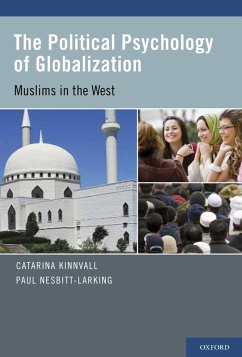
The Political Psychology of Globalization (eBook, PDF)
Muslims in the West

PAYBACK Punkte
15 °P sammeln!
In an increasingly globalized world, there are new economic, strategic, cultural, and political forces at work. IThe Political Psychology of Globalization: Muslims in the West/I explores how these shifts and shocks have influenced the way in which Muslim minorities in western countries form their identities as political actors. Catarina Kinnvall and Paul Nesbitt-Larking uncover three identity strategies adopted by Muslims in the West: retreatism, essentialism, and engagement. Six western countries - Canada, Denmark, France, the Netherlands, Sweden, and the United Kingdom - serve as places for ...
In an increasingly globalized world, there are new economic, strategic, cultural, and political forces at work. IThe Political Psychology of Globalization: Muslims in the West/I explores how these shifts and shocks have influenced the way in which Muslim minorities in western countries form their identities as political actors. Catarina Kinnvall and Paul Nesbitt-Larking uncover three identity strategies adopted by Muslims in the West: retreatism, essentialism, and engagement. Six western countries - Canada, Denmark, France, the Netherlands, Sweden, and the United Kingdom - serve as places for exploration of the emergence of these Muslim political identities. These countries are discussed in light of their colonial histories, patterns of immigration, and citizenship regimes. Although retreatism, essentialism, and engagement occur in Muslim citizens of each of the six western nations discussed in this book, the countries that are best able to balance individual and community rights are most successful in promoting the politics of engagement. In contrast, regimes that focus on anti-terrorist legislation and discourses, and support majority political cultures that are exclusionary, also promote retreatism and essentialist identity strategies in both minority and majority communities. The authors discuss the importance of a climate of engagement that is based on recognition, dialogue, deep multiculturalism, a new global and "cosmopolitical" consciousness, and a sense of political identity that transcends national boundaries and regimes.
Dieser Download kann aus rechtlichen Gründen nur mit Rechnungsadresse in A, B, BG, CY, CZ, D, DK, EW, E, FIN, F, GR, HR, H, IRL, I, LT, L, LR, M, NL, PL, P, R, S, SLO, SK ausgeliefert werden.













